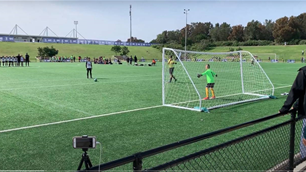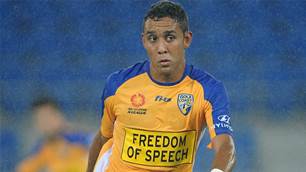How can science counter the scourge of the modern game - diving?
Diving is one of the most maligned behaviours in sport, yet it still pervades the world of football at all levels of the game. Based on research conducted in my research lab at The University of Queensland, I will discuss why diving still abounds and what measures the world's governing bodies can take to reduce its impact.
Many in the footballing world consider it an art form, but most (at least in Australia) consider it the lowest form of cheating. Whatever your thoughts, diving is certainly one of the most controversial and despised actions in sport.
Diving has long been a source of embarrassment for the world’s most popular sport, and most fans of the game have experienced at least one cringeworthy moment when the player they admire throws himself to the ground in a way that resembles a fatal wounding. So if there’s such a general disdain for this deceitful behaviour, why has FIFA had little success at stamping it out?
I believe the answer comes from the realms of biology and human nature.
Let me explain…..but first let me tell who I am.....
By day I’m a scientist in the School of Biological Sciences at the University of Queensland, and I’ve been interested in deceptive behaviour in the natural world for many years. As a football fan, I’ve long been intrigued by the behaviour of diving and the possible mechanisms that could be used to control it. So, when my PhD student Gwendolyn David came into my office one morning and suggested that we may be able to understand diving using evolutionary theory– and maybe even work out how to discourage it – I was instantly sold.
Ideas borrowed from biology suggest deception (of which diving is a nice example) should occur only when the benefits of the behaviour outweigh the costs. In other words, we should expect more diving when the possible rewards are high and the chances of being caught-out are low. More importantly, we should expect that punishment of divers (when caught out) would be the main avenue of stamping out this behaviour. Gwen and I set out to determine whether diving in football is driven by these potential payoffs (benefits) and limited by the probability of its punishment (when divers are caught out).
To do this, we* undertook a play-by-play examination of 60 matches across six high-profile professional leagues to see when and where players faked fouls, and when they were likely to get away with it (or not). We found that – as predicted - diving occurred most often when the potential payoff was greater: namely, in the attacking side of the field and when the two teams had tied scores.
But for us, it was when we looked between the leagues that we found the coolest results. We found that players dived more often in those leagues where the referees were more likely to reward dives with a free-kick or penalty. So it seems that the ability of the referees to detect dives (known in science as receiver discrimination) was driving the frequency of diving by players across the different leagues.
The clear message – if the referees are more easily fooled, then players dive more often.
But what about punishment? Of the more than 2800 falls we observed and 169 dives, we never once saw a diving player punished. This means the predicted avenue of stamping out diving was not being used in any of the high profile professional leagues. Here lies the likely reason diving is still common in the world of football.
It seems that no matter what the league, players will try to deceive referees when the benefits are high enough. But the disincentives are conspicuous by their absence. Of relief to those in Australia at least, is that the two most progressive professional leagues, the A-League and American MLS, have already started handing down punishments for players found guilty of diving. And not surprisingly, the frequency of diving in these leagues seems to be decreasing.
Given that football in Australia and the USA must compete with other more-physically bruising footballing codes, it doesn’t seem surprising to me that fans from both countries have little patience for diving. To the credit of these two associations diving is now on the decrease – in this case, maybe the higher-profile European leagues should follow the example of these newly emerging footballing nations and competitions….
For those interested in reading our full study, our work was published in the prestigious open-access journal, PLOS One, and can be downloaded from the website -
[http://www.plosone.org/article/info%3Adoi%2F10.1371%2Fjournal.pone.0026017].
For those interested in listening to an ABC radio interview in which I discuss our research then you can download the podcast here:
http://blogs.abc.net.au/queensland/2011/10/diving-and-the-art-of-deception-dr-robbie-wilson.html
My broader research into footballing performance….
As this is my first blog for FourFourTwo, I'd like to say a few words about who I am and what I would like to achieve over the coming months with my blog. As a lecturer and researcher in biology at the University of Queensland, I spend most of my time thinking about how animals can perform the range of complex tasks needed during the life and death struggle of nature. My research group works on both animals and humans – and I hope to share with you some of the research we are undertaking to improve the performance of professional and developing footballers.
It’s my firm belief that Australia can become one of the powerhouses of world football. But this can only happen on the back of high quality scientific research. We can’t just copy others - we have to explore innovative and experimental methods of developing players. It’s my aim to convince you that this is possible with the correct plan and public support. Like my lectures at University, I hope that my blog will encourage constructive and open forums to discuss these issues– I’ll be listening to your opinions and will respond to both your challenges and encouragement.
Dr Robbie Wilson
www.soccerscience.net
School of Biological Sciences, The University of Queensland
*In science, academics often use the royal ‘we’ when talking about their research - this really means that our PhD students do all of the arduous grunt work while we take half the credit.
Related Articles

Fresh talent flock to ambitious A-League outfit's pro pathway

Why A-League 20/21 is crucial for Olyroos’ medal hopes













